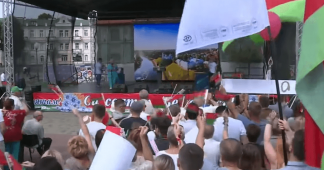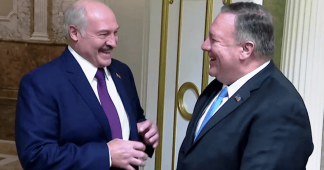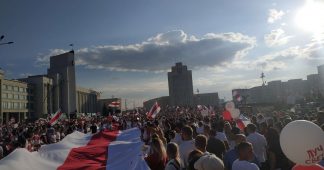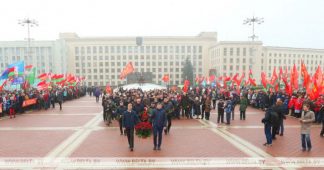Interview with Paul Cabana, representative of Poligraf Red, a Marxist group from Minsk
by Wilhelm Langthaler
01/09/2020
When militia brutality stopped (mostly as a result of the workers’ protests), the number of workers actively supporting the opposition dwindled a lot.
What do you think of the current street movement in Belarus trying to bring down Lukashenko?
The current street movement is the largest we have ever seen in recent history of Belarus. Most of the people involved have no clear understanding of what they really want to achieve, and what is the future they are fighting for. Basically, it all boils down to some vague hope that it is enough to bring down Lukashenko – and everything will be all right.
Of course, the people most likely to come to power if the movement wins have a very clear understanding of this future. It is clearly a neo-liberal vision with massive privatization of state property, deindustrialization, “optimization” of the healthcare system etc.
It goes without saying that, as leftists, we can’t support these aims.
After so many years of failed pro-western efforts to topple Lukashenko why now the opposition for the first time seem to be able to gather popular support?
There is a number of factors that make current situation unique.
First, the worldwide crisis connected, first of all, to the Covid-19 situation, made people much less secure economically. People are simply becoming poorer and it makes them angrier.
Second, recently the government made a number of very unpopular decisions and just blatant mistakes. The most important was an attempt to introduce a kind of unemployment tax, which not only revealed a huge latent unemployment, but also promoted a lot of discontent among the citizens. The contract system of employment that basically deprived employees of many of their rights was and remains very unpopular, too. Also, the retirement age was raised, which is never a popular move. Finally, the President’s joking denial of the Covid-19 problem unnecessarily made many people angry (while in reality Belarusian healthcare coped with the problem relatively well).
Third, this time there was a massive campaign in favor of the candidate Viktor Babariko in the Internet media. It was clearly expensive, well-made and bigger than we have ever seen. The government media are limited to TV and newspapers and the government’s viewpoint have almost no presence in the Internet. Ruling regime just didn’t understand the full scope of the Internet’s effect on people’s minds.
What about the workers’ strikes? Are they really backing the neo-liberal capitalist forces?
First, we had very few real strikes. Mostly, it was just a pre-strike situation – which now in many cases is effectively over. The workers are a part of the population – and among the workers there are also politically active supporters of the opposition. But they neither were nor are a majority.
The problem is that the militia (police) brutality immediately after the elections was on a scale never before seen in Belarusian recent history. And it made the inert apolitical majority of the workers support their more politically engaged colleagues.
When militia brutality stopped (mostly as a result of the workers’ protests), the number of workers actively supporting the opposition dwindled a lot.
Still many workers take part in demonstrations and threaten with strikes, but in fact the opposition is clearly disappointed – their hopes for some kind of Polish „Solidarność” movement weren’t satisfied.
Can the Belarus movement be compared to the Ukrainian Maidan?
Of course, the comparison with Maidan is an obvious one. After all, it is a Liberal protest under Nationalist flags with a clear support from the EU. But the differences shouldn’t be ignored, too. First, the far-right forces right now are hardly noticeable (although they certainly take part in the movement). The Nationalists are in fact much weaker in Belarus than in Ukraine. Second, we don’t have the Ukrainian groups of powerful oligarchs fighting for power (many of our oligarchs are closely connected to the ruling regime). Generally, currently the protests are much more peaceful and inclusive. For example, you wouldn’t be beaten if you come to the protests with a USSR flag.
But some dangerous similarities are emerging nevertheless. For example, different bullying campaigns in the Internet against teachers who were supposedly taking part in the falsification of the elections.
What you think about the repressive response of Lukashenko? Isn’t that a push for the movement?
Yes, it certainly was. The response was not only the harshest we have ever seen, but also apparently uncalled for. Stun grenades and rubber bullets basically made Minsk look like a warzone on the night of the elections. People were beaten and tortured.
It really shocked a lot of previously apolitical citizens and made them actively take part in the protests. It was clearly a huge mistake on Lukashenko’s part.
The Kremlin seems not to actively back Lukashenko. How is this to be explained? Might they even try to replace Lukashenko from within?
Recently Kremlin have actually backed Lukashenko – clearly after some big promises from Belarusian president.
But talks about replacement plan were and are still abundant. The most suspicious thing is, of course, the fact that candidate Viktor Babariko was actually a director of the daughter company of the Russian Gazprom. Together with the appearance of a Russian private military company in Belarus, it even made Lukashenko directly blame Russia for interfering in the elections. But now it seems in the past.
Anyway, we can’t be sure to really know the actual truth in this matter.
Is the movement already receding or is it still ascending?
Basically, it swings back and forth. Sometimes it appears that it is on a brink of victory, sometimes – that it is almost over. Now, after schools and universities opened on September 1st, we will certainly see a rise in the protest activity.
As leftist and communist forces what is your proposal for overcome the crisis? Or: is it possible to maintain the social gains and nevertheless allow for a democratisation?
It would be certainly possible to maintain the social gains and nevertheless allow for a democratization if the left were doing it. Otherwise, both Lukashenko and opposition will inevitably move the economy more and more towards neo-liberalist model. But right now the left forces in Belarus are catastrophically weak and have no chances to come to power. It is a sad thing to recognize, but currently we basically can do nothing. And whichever side of the battle wins, the left will most likely suffer some kind repressions.
What we can do is to gather new people, form and strengthen organizations, promote left ideas and establish connections with the workers’ collectives. Just to be ready for the next time a similar crisis strikes. And that is what we intend to do – in any circumstances.
Can you describe your group?
We are Poligraf_Red – a Marxist group from Minsk. We are have an online magazine http://poligraf.red/(link is external) and a YouTube channel https://www.youtube.com/c/POLIGRAFRED(link is external).
In a situation when the liberals and nationalists completely dominate public opinion we think it is especially important to fight for what Gramsci called cultural hegemony. So in the world ruled by information our aim is to function as an Internet media to promote communist agenda and Marxist theory.











